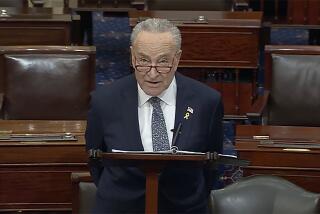Bushâs Germany Visit Seen as Chance to Ease Tension
BERLIN â The U.S. and Germany view the world in vastly different ways, but a February meeting between President Bush and Chancellor Gerhard Schroeder is expected to bolster a transatlantic relationship strained by the Iraq war.
The get-together is not expected to resolve divisions over Iraq, environmental protection and the U.S. refusal to join the International Criminal Court, which prosecutes war crimes. But diplomats and analysts say the meeting is a signal that Washington and Berlin remain partners in an era of terrorism and changing strategic alliances.
âNo one can afford a continuing transatlantic rift,â said Stefan Froehlich, an international politics professor at Erlangen-Nuernberg University in southern Germany. âI donât expect any breakthrough on contentious issues. But we have to start talking again. The question is what will Bush bring? What will he offer?â
There have been recent diplomatic successes between the two countries. Germany has expanded its mission in Afghanistan. Berlin and Washington are working together to fight extremism, help resolve the Ukrainian election crisis and move Turkey closer to joining the European Union.
But Berlinâs strong opposition to the war and its resistance to committing troops to Iraq have agitated a Bush administration desperate to strengthen coalition forces in a show of international solidarity.
The day before Bush arrives in Germany on Feb. 23, he is scheduled to meet with leaders of the European Union and the North Atlantic Treaty Organization in Brussels as part of a wider effort to repair European relations and persuade reluctant allies to contribute to Iraqâs reconstruction and security.
Bushâs trip also is expected to include a stop in Slovakia and talks with Russian President Vladimir V. Putin.
European analysts say Bush needs to reengage the continent at a time when the European Union is expanding and Moscow is feeling isolated. But German media are wondering what Schroeder can expect from talks with a U.S. president who largely ignores Europe and acts unilaterally when he sees fit.
âMy guess is theyâll focus on Germanyâs good job in Afghanistan and not on Iraq,â said Bernhard May, an analyst at the German Council on Foreign Relations. âBut they canât just meet and say hello. There is a window of opportunity for Germany and the U.S. to come together on important issues.â
Bush and Schroeder are not political soul mates; their relationship is one of forced congeniality. Officials in their administrations havenât helped much. A Schroeder official once compared Bush to Adolf Hitler, and U.S. Defense Secretary Donald H. Rumsfeld referred to Germany as part of âold Europe.â
âAttempts at rapprochement are to be welcomed, but there is a danger of disappointment should it not go beyond superficial gestures,â wrote the Financial Times Germany.
âThis is not a president whoâll fly to Germany just for a photo opportunity. Heâll want to discuss substantive things,â said Gary Smith, executive director of the American Academy in Berlin, a nonprofit center seeking to strengthen German-American ties. âItâs not all about Iraq anymore. The Germans believe very strongly that a new transatlantic agenda has to be established.â
Among pressing matters are a lack of cohesive diplomatic and military strategies for dealing with Iraq and the Middle East. Washington and Berlin have different ideas for resolving the Israel-Palestinian conflict. The Bush administration has allowed attempts by London, Paris and Berlin to negotiate an end to the Iran nuclear dilemma, but there is no consensus on what to do if Tehran persists in uranium production.
Schroeder wants to expand trade with China and has called for lifting the European Unionâs ban on selling weapons to Beijing -- a scenario Washington opposes.
Berlin also is lobbying for a permanent seat on the United Nations Security Council, which it regards as recognition of Germanyâs emergence as a world power. The Bush administration hasnât openly supported the effort, and analysts suggest that the U.S. will vote against it.
Despite differences with Washington, Germany remains wary of aspirations by Paris to counterbalance the U.S. with a stronger European partnership.
Yet Schroeder has broadened his international endeavors and in recent months simultaneously courted Washington and Moscow.
The German media reported that the chancellor, perhaps in a gamble that could hurt him with the U.S., was strengthening ties with Putin.
âSchroeder is playing a risky game of foreign policy poker,â wrote the newsmagazine Der Spiegel. âHe is playing the anti-U.S. card at home, but seeking to improve transatlantic relations at the same time. Meanwhile, Russia is slowly replacing the U.S. as Germanyâs closest ally.â
Schroederâs reelection in 2002 was mainly attributed to his opposition to the Iraq war. Many Germans now want reconciliation over Iraq and improved relations with America.
The chancellor faces tough political navigation: He canât appear to pander to Washington, but he does not want to be remembered as the leader who destroyed the long-standing relationship between his nation and the U.S.
Bush faces his own domestic pressures. Some conservative supporters of the president want to continue punishing Germany over Iraq. This comes as the U.S. is closing military bases in Germany and moving them east -- an indication that Western Europe is less strategically important for fighting global threats after the Cold War.
Germans also are concerned that U.S. foreign policy may veer in a more isolationist direction once Condoleezza Rice replaces Colin L. Powell as secretary of State.
More to Read
Sign up for Essential California
The most important California stories and recommendations in your inbox every morning.
You may occasionally receive promotional content from the Los Angeles Times.











